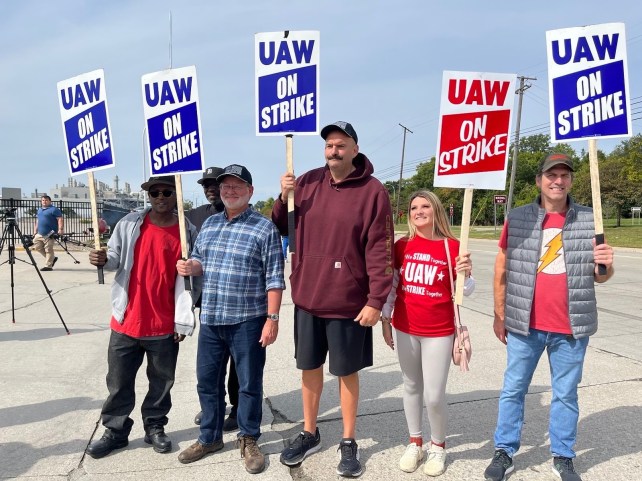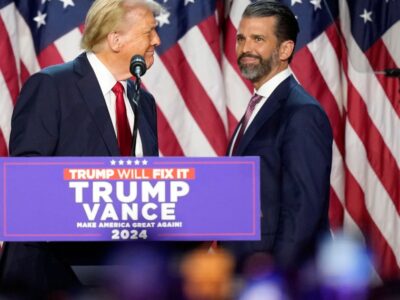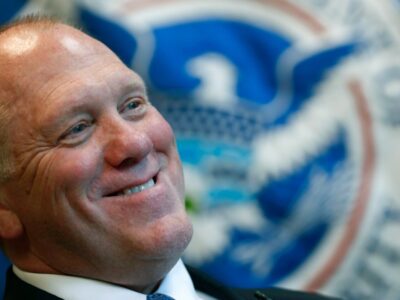
After the UAW went on strike last week, Sen. Josh Hawley (R-Mo.) took to social media to declare, “Auto workers deserve a raise.” Fellow New Right Sen. J.D. Vance (R-Ohio) wrote that he was “[r]ooting for the auto workers across our country demanding higher wages.” If you stopped there, you might have concluded something unusual was happening.
For the small subset of Republicans who want to be seen as class warriors, the ongoing UAW strike involving roughly 13,000 workers at three plants in Ohio, Missouri, and Michigan poses a problem. If Hawley and Vance’s rhetoric about making the GOP the party of the working class is to mean anything, they have to support autoworkers. But to fulfill their broader goal of reframing the class war as a culture war, the strike needs to become yet another example of coastal elites squeezing Americans in the heartland.
That is where the caveats come in: The real villain in the labor battle, Hawley and Vance argue, is not the car companies making tens of billions dollars per year, but the Democrats pushing electric vehicles. As Hawley put it in the back half of his post, autoworkers “deserve to have their jobs protected from Joe Biden’s stupid climate mandates that are destroying the US auto industry and making China rich.”
Vance quickly followed up with a conspiratorial letter addressed to Gene Sperling, the senior White House adviser serving as a liaison to the UAW. Vance thought it “seemed hardly coincidental” that two of the initial three plants that went on strike were in red states. He hinted that the UAW and the White House might have struck a deal to protect Michigan’s economy and, by extension, Biden’s chances of winning a battleground state. “I fear that Gene Sperling has exploited the UAW to protect Joe Biden’s failed agenda at the expense of American workers,” Vance added.
Vance and Hawley are seizing on something real: Autoworkers are frustrated with how the Biden administration has gone about promoting a transition to electric vehicles. The Inflation Reduction Act was going to have a $4,500 credit for electric vehicles built with union labor; it was cut in response to opposition from Sen. Joe Manchin (D-W.V.); this summer, the Department of Energy awarded a $9.2 billion loan to Ford and its South Korean partner, SK On, to build two battery plants in Kentucky and another in Tennessee that will not be covered by Ford’s national agreement with the UAW. The funding, which included no requirements that Ford use union labor or provide a living wage, led UAW President Shawn Fain to ask, “Why is Joe Biden’s administration facilitating this corporate greed with taxpayer money?”
Earlier this month, the White House tried to repair the rift with the UAW, which has not yet endorsed Biden. It announced that unionized factories would have a leg up when applying for $12 billion of grants and loans set aside for converting plants to produce electric vehicles. More than $3 billion in grants for battery plants will similarly prioritize projects that are likely to employ union workers, according to the White House. On Friday, Biden echoed the UAW’s overarching demand by saying that he believes that record corporate profits should “mean record contracts for the UAW.”
In line with Hawley, Donald Trump said on Meet the Press last weekend that “electric cars, automatically, are going to be made in China.” It is true that, aside from Tesla, Chinese companies dominate electric vehicle manufacturing. That is precisely why the Biden administration is using industrial policy to try to catch up by providing funding for plants throughout the United States.
Trump and other Republicans seem to think China should remain dominant, while the United States focuses on increasingly outdated technology. It’s not a serious strategy: There is a reason the right’s favorite billionaire chose to make his fortune in electric cars. The UAW’s main critique is not that Biden is pushing for American-made electric cars, but that he’s not doing enough to protect union jobs while doing so.
The comments by Trump, Vance, and Hawley are more than just a distraction from the economic issues at hand—they are attempts to divide union members from their leaders. (As Trump said in his MTP interview, “The autoworkers are being sold down the river by their leadership, and their leadership should endorse Trump.”) A few years ago, when the UAW was embroiled in corruption scandals, the strategy would have had a better chance of working.
Today, the union is led by a third-generation UAW member who keeps one of his grandfather’s pay stubs in his wallet and who was elected earlier this year by members fed up with the status quo. He cannot credibly be accused of being a representative of the professional managerial class Vance and Hawley love to rail against, despite the fact that both graduated from Yale Law and received substantial support from Peter Thiel.
On Monday, New York magazine profiled Oren Cass, a former management consultant and Mitt Romney adviser who is now mostly failing to map out a pro-worker conservatism. Matt Bruenig, founder of the left-wing People’s Policy Project, argues in the piece that the problem facing Cass’ group, American Compass, is that anytime it proposes doing something that helps the working class, “Democrats immediately are like, ‘Great, let’s do it,’ and then that alienates Republicans…So to avoid that, they end up proposing stuff that actually just kind of sucks.”
The New Right response to the UAW strike is perfect example of that in action. A strong contract will not only benefit the roughly 150,000 UAW members at the Big Three, but will also help push up wages throughout the industry and—by showing the benefits of collective bargaining—make it easier for the union to organize new plants. Democratic Sens. Sherrod Brown, John Fetterman, and Bernie Sanders, who quickly met with UAW members in Ohio and Michigan, understand that. (Fetterman made the nearly 300-mile drive from Braddock, Pennsylvania, to Wayne, Michigan, in his Ford Bronco, where he joined the striking members of Local 900 who make it.)

Fetterman on the picket line this weekend.
Office of Sen. Fetterman
Not to be outdone, Trump is reportedly planning to go to Detroit next week to speak to current and former members of a wide range of unions during the second GOP debate. Fain was not impressed. “Every fiber of our union is being poured into fighting the billionaire class and an economy that enriches people like Donald Trump at the expense of workers,” he said in a statement. “We can’t keep electing billionaires and millionaires that don’t have any understanding what it is like to live paycheck to paycheck and struggle to get by and expecting them to solve the problems of the working class.”
Editor’s note: The author of this post and other Mother Jones workers are represented by UAW Local 2103.















